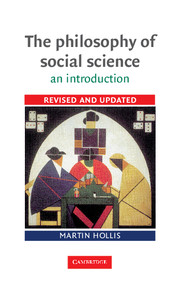Book contents
- Frontmatter
- 1 Introduction: problems of structure and action
- 2 Discovering truth: the rationalist way
- 3 Positive science: the empiricist way
- 4 Ants, spiders and bees: a third way?
- 5 Systems and functions
- 6 Games with rational agents
- 7 Understanding social action
- 8 Self and roles
- 9 Explaining and understanding
- 10 A value-neutral social science?
- 11 Rationality and relativism
- 12 Conclusion: two stories to tell
- Bibliography
- Index
5 - Systems and functions
Published online by Cambridge University Press: 03 July 2012
- Frontmatter
- 1 Introduction: problems of structure and action
- 2 Discovering truth: the rationalist way
- 3 Positive science: the empiricist way
- 4 Ants, spiders and bees: a third way?
- 5 Systems and functions
- 6 Games with rational agents
- 7 Understanding social action
- 8 Self and roles
- 9 Explaining and understanding
- 10 A value-neutral social science?
- 11 Rationality and relativism
- 12 Conclusion: two stories to tell
- Bibliography
- Index
Summary
Marx's Preface, quoted in Chapter 1, declared that the sum of the relations of production 'constitutes the economic structure of society, the real foundation, on which rises a legal and political superstructure . . . It is not the consciousness of men that determines their being, but, on the contrary, their social being that determines their consciousness.' By contrast, Mill stated: 'The laws of the phenomena of society are, and can be, nothing but the laws of the actions and passions of human beings united together in the social state . . . Human beings in society have no properties but those which are derived from, and may be resolved into, the laws of nature of individual man.' In the next two chapters we shall reflect on this stark disagreement.
Their aim is to flesh out the kind of thinking suited to the top left and bottom left boxes of Figure 1.2 and to see whether either can persuade us that the other is secondary. At the same time we shall be alert for signs that the explanations proposed may depend on understanding social systems or agents from within. Holists about explanation will need to deal not only with individualists but also with holists who advocate understanding. Individualists about explanation will similarly have a flank to guard against individualists who favour understanding.
- Type
- Chapter
- Information
- The Philosophy of Social ScienceAn Introduction, pp. 94 - 114Publisher: Cambridge University PressPrint publication year: 1994



